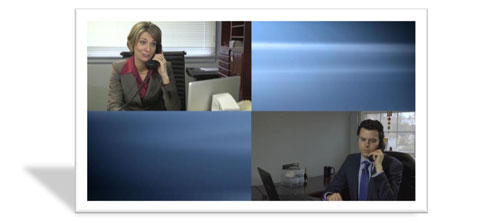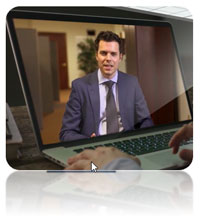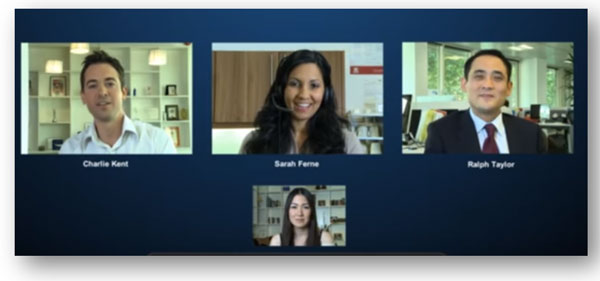Types of Interview
Click on the play button to view the introduction video
Telephone Interviews

Telephone interviews are usually used to screen candidates early in the process, though it is not unheard of to hire someone on the basis of a telephone interview.
Generally, companies and recruiters rely on phone interviews to identify suitable candidates and eliminate unqualified applicants, especially when the job seeker and interviewer are located in different cities.
With many companies, in order to get invited to an in-person interview, you must impress them on the phone. It's important to treat a phone interview as seriously as you would treat an in-person interview. This is often your first chance to impress.
Handy Hints:
Select a time when you won’t be interrupted and find a quiet place away from crying babies, barking dogs, and the distant sound of TV or radio.
Turn off the ringers, bells, and alerts on your gadgets.
Shut down your email and other distractions. This is not a time to multi-task. Stay focused on the conversation.
Plan to use a land line (if possible) to ensure that bad mobile phone reception won't be a factor.
Make sure that your voice mail greeting is professional and appropriate if you want to make the right impression when employers and networking contacts call you.
Arrange all of the documents that you'll need within easy reach — résumé, notes, job description. You might also keep your interview stories and your list of strengths and accomplishments handy for reference. One of the benefits of a phone interview is that you can check your notes without the interviewer knowing.
Enunciate, keep your answers short, and don’t be afraid of pauses. Because you can't see your interviewer, it may be more difficult to tell how she is responding. Many interviewees start babbling to compensate. Don't do it.
Often, a pause just means the interviewer is making a note, searching for her next question or waving a colleague out of her office. If the pause continues, it's perfectly fine to ask something like: "Can I provide any additional details on that point?"
Smile and gesture as if you were speaking with someone face-to-face. This will help infuse energy and personality into your voice, which is the only thing your telephone interviewer really has to judge you by at this point.
For this reason, you may also want to take the time to dress professionally for the call to ensure that you are mentally in interview mode.
Don’t interrupt questions or observations, but employ active listening techniques, saying “I see” during pauses, for example, and offering brief acknowledgements to comments.
In-Person Interviews
Most of your job interviews will be in-person conversations. Just you and your interviewer in his office or in a conference room.
Often, you will be asked to meet separately with multiple interviewers during a single visit to the employer's offices. This is a good sign. Someone has decided it's worth making time for you on multiple executive schedules.

Handy Hints:
It's important to prepare for each of the scheduled interviews. Find out as much as you can about each of the interviewers and the order of the meetings. However, there are some special considerations when meeting with a series of one-on-one interviewers:
Remember to tailor your responses for each interviewer. Try to understand each questioner's role in the hiring process and perspective on the position.
Don't be afraid of repetition. Each interview is a new conversation. Don't gloss over important points because you've already made them.
Keep in mind that you'll have to present your key accomplishments and strengths to each of the interviewers.
Make an effort to keep your energy up.
Get up and stretch your legs between sessions. Don't be afraid to ask for a glass of water or for a restroom break.
If one meeting doesn't go well, shake it off and start fresh. Not everyone is going to love you, but you can still land the job if you win over the majority.
Be prepared for changes in the schedule. A scheduled interviewer may be unexpectedly unavailable or may be running late.
If a new interviewer is suddenly added to the schedule, that's a sign that things are going well, and the company wants to fit in meetings with as many decision makers as possible while you're there.
Virtual Interviewer
Click on the play button to see how SalesXtra promotes virtual interviewing to our members
Virtual Interviews are becoming more popular with interviewers because it slashes the normal recruitment time and they get to see how a candidate responds to video questions without forming a personal relationship.
Instead of interviewing job candidates in person, a virtual interview lets interviewers speak to applicants through a series of pre-recorded questions where job candidates can leave recorded video responses using their webcam.

|
In an automated interview, the recruiter posts a pre-recorded videos or text questions. The applicants are invited to view the video and record their answers using the built-in video camera.
Video interviews can take place anywhere. It doesn’t matter where you are in the world, as long as you have a strong Internet connection and a decent Web camera. Neither the recruiter nor the applicant will have to travel in order to meet and talk.
|
Because the applicants’ responses are recorded online, the recruiter has the luxury of viewing interview results at his or her own convenience.
Handy Hints:
Prepare for a virtual Interview exactly the same way you would for an in-person interview.
Practise your responses with the interview builder.
Respond confidently to each question…and keep your answers brief and concise.
Beware of your body language and keep a pleasant look on your face at all times. Facial expressions are exaggerated in video.
Dress as you would for a live interview.
Turn on the lights to avoid looking grey or drab.
Talk to the camera not your notes. Make eye contact as if this was a live interview
Video Interviews
More and more often, employers are now conducting first-round interviews via video conference instead of via phone.
Video allows for a richer interaction when interviewing applicants, but it also requires that candidates have access to a webcam and video conferencing facilities.
Now that webcams come installed with most laptops with Skype and similar services widespread, video interviews are increasing in popularity.

Handy Hints:
Prepare for your video interview as you would for a face-to-face interview. Dress in your interview best.
Test your webcam and videoconference service well in advance of your interview. Make sure that you have installed any necessary software and do a run-through of making and/or answering a videoconference call with a friend if you can.
This will allow you to get comfortable with the interface and make sure that your webcam, microphone, and headset or speakers are working. A simple headset may be a worthwhile investment if you don't have one.
Choose a location with a neutral and uncomplicated background, then turn on your webcam to see how you'll look to the interviewer. You can adjust your webcam to find the angle and distance that feels most comfortable.
Find a private spot for conducting the interview, preferably a room with a door that closes and locks. You don't want your roommate or cat wandering into the frame when you're in mid-interview.
Make sure you have a steady and reliable internet connection. Keep the interviewer's phone number nearby in case of technical difficulty on either side of the interview.
Keep important things nearby. Arrange your resume, notes, and other materials nearby. Prepare sufficiently so that you won't need your notes as a crutch, but it reassures some people to have them at hand just in case.
Making eye contact is a bit different via video conference. Generally, video conferencing uses a picture-in-picture format, so you can see both your own image and that of your interviewer.
Your best bet is to try to position the window on your screen so that the video image of your interviewer is near your webcam. This way, you can make fairly natural eye contact with your interviewer's video image while also looking into the camera.
As a result, you will appear to be looking straight out at the interviewer from her screen. If this isn't technically possible for you, practice looking into the web cam when you speak instead. At first, this will feel a little bit awkward.
That's why it's important to practice so you don't seem jittery and unprepared during the actual interview. As with in-person interviews, your eye contact should be steady and natural. There's no need to stare into the webcam and it's perfectly okay to glance down or at the screen when the interviewer is speaking.
Shut down other applications and any alarms, ringers, or sounds. Also, remember to avoid distracting sounds a microphone would pick up, such as shuffling papers or fidgeting.
Panel Interviews
The panel interview may be the most intimidating, because you know you'll be outnumbered.
There may be some gamesmanship a foot to trip you up and see how you respond under pressure. However, the panel's collective interest is to hire the best person for the job.
You will be bombarded with questions from each panel member, each pertaining to the unique interests and attitudes of the questioner.
Chances are, no matter how much you have prepared, you are not going to be everyone’s favourite candidate.
Your goal is to be the consensus choice. Aim high and try to win all of them over.

Who will be on the panel? The immediate department head or superior is going to be there, probably with his boss. A top executive, possibly even the CEO, may participate. You may also encounter a senior human resources manager and representatives from other departments or divisions that will work closely with you if hired.
Handy Hints:
In a panel interview, you must remember to maintain eye contact with the person asking the question, sweeping the room periodically like a panning camera lens and connecting with others as you respond.
Questions may be rapid-fire, but don't let that throw you off. Enunciate and pace yourself. Pause to consider and form responses as needed. This approach will make you seem more confident and in control.
Your pre-interview research is even more critical when preparing for a panel interview. Ask who will be taking part when the panel interview is scheduled and find out as much as you can about their backgrounds and current roles. This will help you understand who may be asking what and how you might be able to find common ground with each.
Remembering names is important, so take advantage of introductions to say each panellist’s name when you shake hands and make initial eye contact. This will help etch their names into your memory when the questioning starts. As soon as possible, write the names as they are positioned in the meeting. Remembering each name is particularly critical at the end of the interview when you thank each participant by name with a handshake.
Group Interviews

In a group job interview, multiple candidates are assembled to perform an exercise. Often, a case study or hypothetical scenario is presented for the group to analyse.
However, group interviews may also centre around team presentations, competitive Q&A, and even exercises such as Lego building.
These interviews are designed to evaluate how you work in a team and/or competitive situation.
You will be observed and evaluated during the exercise and then interviewed about your experience (either one-on-one or in the group environment).
Picture of mixed business group
Handy Hints:
You will usually be asked about the group's overall experience, your role, and your teammates' contributions.
Don't hesitate to step up and participate. A group interview may feel somewhat unnatural but do your best to show what you can do. If you hang back, you may be overlooked. That doesn't mean you should try to dominate the group, but, by all means, take an active role.
Analyse the job description to understand the most important qualifications for this job. Demonstrate the qualities emphasized in the job description when performing your group task. If the job demands leadership skills, take a lead role in the task. If the position requires conflict resolution abilities, show your skills as a mediator.
When you are interviewed about your experience with the group, show your analytical skills by thoughtfully evaluating what went well and what could have been better. Keep your answers positive and avoid personal critiques of team members. The interviewers will be trying to understand how you think and how you interact with others.